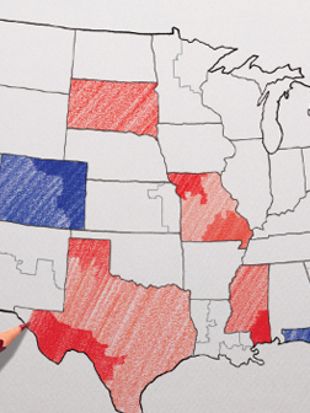
Gerrymandering is an eye-opening documentary examining the longstanding practice of the geographical manipulation of boundaries for voting purposes. Drawing on interviews from across the political spectrum, the film presents the compelling argument that allowing legislators to draw voting districts means "you don't pick representatives; your representatives pick you." Director Jeff Reichert utilizes archival footage of news reports, various law professors, policy experts, dedicated activists, and even politicians themselves to frame this argument and makes it clear that this is a practice that has plagued our political system for over 200 years -- well since the beginning of the union.
The film begins on November 4, 2008, Election Day, in the office of activist Kathay Feng, executive director of California Common Cause, an organization whose sole purpose is passing Proposition 11, a mandate that would require moving the power of redistricting from politicians to an independent commission of private citizens that is both ethnically and politically balanced. Feng is fighting for the Asian community in San Francisco, whose districts have been cut up into three or four pieces to benefit the incumbent. Kathay's struggle is just one of many examples in Gerrymandering of various activist movements across the country.
Though the film has leftist leanings, Reichert succeeds in creating a balanced view of the issues and has no qualms about exposing both Republicans and Democrats. He shines a light on Austin, TX, where 40 Democratic congressional members fled across state lines to avoid a redistricting crusade lead by former Senate Majority Leader Tom DeLay during the Bush administration. As a result, six Democrats lost their seats in a state that had been historically Democratic. Reichert even throws the dagger at Barack Obama, who also benefited from gerrymandering. In 2000, Obama ran for a congressional seat with a majority black constituency and lost to an incumbent. The lines were redrawn to favor the largely liberal area of Chicago's Gold Coast, which resulted in a huge turning point in his political career.
Despite the doom-and-gloom atmosphere, Gerrymandering ends on a hopeful note. First, Reichert gives an example of how gerrymandering may benefit the system. He points to La Belle, FL, where Dave Aronberg, a Florida state representative, benefited from what was left over after redistricting in 2001 -- an unintended consequence that actually made the district competitive. Aronberg argues that he's become a better legislator because he's had to represent many different kinds of people who identify themselves as Republicans, Democrats, and Independents. Second, Reichert returns to Kathay Feng on the night of the election. Proposition 11 passes, but as Kathay points out, the work isn't over yet; it's a victory that needs to be maintained.
Gerrymandering is a way to educate the public -- and in some ways enrage them -- about a practice that has a profound effect on our democracy, but as one expert put it, "people only care about redistricting when it comes to schools -- otherwise they don't give a damn." This film is definitely a must-see for people who do give a damn, but more importantly for those who care about America and its political system, and want to find a way to help fix it.
